Brent Marchant's Blog, page 66
June 10, 2020
‘Papicha’ showcases the rewards of risk
“Papicha” (2019 production, 2020 release). Cast: Lyna Khoudri, Shirine Boutella, Amira Hilda Douaouda, Yasin Houicha, Marwan Zeghbib, Zahra Doumandji, Meriem Medjkrane, Samir El Hakim, Nadia Kaci, Lina Boudraa, Khaled Benaissa, Malek Ghellamat. Director: Mounia Meddour. Screenplay: Mounia Meddour and Fadette Drouard. Web site. Trailer.
Taking risks can be a scary prospect, and the bigger the risk, the greater the potential peril. However, the same is true when it comes to the prospective risks involved. Of course, it takes considerable resolve to face such conditions, but that’s entirely possible, as showcased in the inspiring new period piece drama, “Papicha.”
For those who lived through the perils of the 1990s Algerian Civil War – a time that came to be called “the dirty war” or “the black decade” – the fallout from the struggle affected virtually every aspect of daily life. For some, that included implications whose impact was felt in highly personal ways, often involving things that bore little or no connection to the kinds of matters that typically come up for contention during armed conflict and sociopolitical debates. And, in this case, some of the worst torment was borne by the nation’s women.
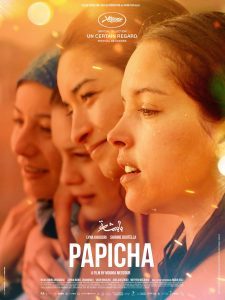
After winning a nearly eight-year War of Independence in 1962, the former French colony emerged as a largely secular state with socialist leanings. Over time, though, the North African nation began to push for a return to the Islamist roots of its predominantly Arab population. And, by the 1990s, powerful fundamentalist factions fought to obtain political control, eventually pitting strict Muslim traditionalists against their more liberal Westernized counterparts. As the two sides vied for power, a brutal civil war broke out that killed upwards of 150,000 (some say more) and displaced countless refugees.
As the war raged internally, fundamentalists placed extreme coercive pressure on their secularized counterparts to conform to traditional Islamic dictates. Again, the greatest coercion was imposed on women, especially those who embraced the “decadent” and “immoral” ways of the West and who openly defied the far more restrictive doctrinal conventions that were supposed to be accepted without question. The euphemistically characterized requirement that women dress and carry themselves “modestly” was, in fact, an orchestrated effort to place them under the thumb of a male-dominated power structure that treated them like property, and those seeking to assert control often did whatever they believed was necessary to make this possible, employing the services of both male and female followers. Yet, for all the strong-arm tactics inflicted upon the women of Algeria, there were those who would have none of it, despite the dangers involved in openly resisting such efforts.
That’s where the papicha segment of society came into play. “Papicha” is an Algerian term used to describe an intelligent, confident, liberated, often-stylish and attractive woman. For all practical purposes, one could consider papichas the feminists of this North African nation, and that is how many have typically viewed themselves. However, during the Civil War, fundamentalists often used the term in a less flattering way, almost on par with “harlot” or “whore.” Nevertheless, many women who saw themselves in the more traditional sense of the term tended to let the derogatory label slide off their backs, taking pride in their self-assurance and courageously asserting themselves in their convictions.
That kind of strident confidence characterizes the young women in this story, nearly all of them students at an all-female university in Algiers, the nation’s capital. The most outspoken among them is Nedjma (Lyna Khoudri), a budding fashion designer who comes up with stylish creations for women who frequent the city’s nightclubs. Working with her friend, Wassila (Shirine Boutella), Nedjma’s underground dressmaking operation grows popular and develops quite a reputation.

Nedjma (Lyna Khoudri, center), a budding fashion designer, seeks to make a statement with her creations during the tyranny of the 1990s Algerian Civil War in the inspiring new period piece drama, “Papicha.” Photo courtesy of Distrib Films US.
However, carrying out this venture has more than its share of risks. Getting to the clubs is often an ordeal in itself; Nedjma and Wassila must disguise themselves in traditional garb, and their rides to the nightspots frequently take them through military checkpoints. Then there’s the matter of even being able to leave the university premises; to gain access to the outside world after dark, Nedjma must pay off the college’s seedy gatekeeper, Mokhtar (Samir El Hakim), to keep him from talking, a fee that he keeps raising, even suggesting that it can be paid with more than just money. And, of course, there are probing questions from fabric suppliers who wonder what Nedjma needs with all of the bright and fancy cloth she buys – materials that she couldn’t possibly be using to sew the traditional black hijabs worn by compliant Muslim women. Still, Nedjma believes in what she’s doing, not only for the fulfillment she gets from designing her creations, but also for the personally defiant statement she makes through her efforts.
Nedjma differs from her classmates in other ways, though. Given the prevailing conditions in Algeria, many of them are looking for ways to leave the country, convinced that things will only deteriorate further. Her friend Kahina (Zahra Doumandji), for example, wants to emigrate to Canada; she sees herself being like the many others who live in “the waiting room” that is Algiers, biding their time until exit visas come through, a situation not unlike that depicted in the title location of the World War II screen classic “Casablanca” (1942). Others hope to marry themselves off to wealthy spouses who will take them away from the conflict and the coercion, either out of the country or in secluded estates where they can sustain their secularized lives out of sight. And some have agreed to capitulate to the winds of change, such as Samira (Amira Hilda Douaouda), an intelligent but pious young woman who’s already agreed to submit to the will of her husband-to-be in their impending arranged marriage, including giving up the studies she needs to complete her degree program.
Nedjma will have none of that, though. She’s determined to stay in Algeria, the homeland she loves, but without compromising. In fact, in some ways, she’s rather militant about the imposition of fundamentalist rule, unabashedly engaging in such acts as vandalizing publicly plastered posters compelling women to don hijabs, the “proper” garb for outside the home, notices that even detail how they should be worn. She willingly participates in shouting matches with fundamentalist women when they try to tell others – including male university professors – how to behave. And she even refuses to ingest the dining hall food that has been “dosed” with dangerously high levels of the epileptic sedative potassium bromide, a deliberate effort to reduce “female urges.” It’s a substance that can have hazardous side effects over time, and this practice goes on unabated under the oblivious eye of the university’s head mistress, Madame Kamissi (Nadia Kaci).

While visiting her mother, budding fashion designer Nedjma (Lyna Khoudri, left) learns about the tradition of Algerian haiks, garments intended to accentuate feminine beauty, in director Mounia Meddour’s feature film debut, “Papicha.” Photo courtesy of Distrib Films US.
Under these circumstances, Nedjma has much to contend with, but she still manages to find the time to work on her designs. On a visit to see her mother and her sister, Linda (Meriem Medjkrane), she becomes captivated with the design possibilities for creating haiks, a traditional Algerian garment crafted from a single large, rectangular swath of fabric whose distinctive qualities are crafted using different forms of folds and draping. Unlike hijabs, whose intent is to promote modesty and conformity, haiks are designed to celebrate beauty, a form of clothing that flatters, rather than degrades, women. Linda and mom show Nedjma the various ways that haiks can be worn, some of which are purely decorative and others of which are ceremonial. There are even “practical” options, such as haiks fashioned to conceal weapons, a form of the garment that was often worn by female freedom fighters during the Algerian War of Independence.
Clearly, Nedjma lives her personal power. But her confidence in that power is tested when she experiences a family tragedy, one so severe that it nearly saps all of her resolve. Rather than be deterred, however, she redoubles her efforts and makes an important decision: She vows to stage a runway-style fashion show of her designs, all of which are different styles of haiks, with her friends and classmates serving as models. In essence, she seeks to make a fashion statement that makes a statement in itself.
Thus begins Nedjma’s campaign to put on her show. But, as her plans unfold, they nearly derail as she’s met with constant setbacks, challenges that push her to the limits of her ability to carry on. Nevertheless, given how far she’s come thus far, there’s no stopping the papicha from living up to her reputation – and showing the world just what she can do.
Accomplishments like those tackled by Nedjma and her peers are truly inspiring, especially under the conditions they faced. Many may have backed away because they saw the challenges as too daunting, while others may have given up out of intimidation. But not Nedjma; she moved forward because she believed in what she set out to do, and the power of those beliefs helped to make her goals attainable. Such is what happens when we set our minds to effectively employing the conscious creation process, the philosophy that maintains we draw upon these intangible resources in manifesting the reality we experience.
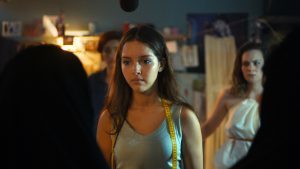
When confronted by fundamentalist insurgents critical of her decadent Western ways, fashion design student Nedjma (Lyna Khoudri, center) stands her ground against those seeking to quash her plans for staging a fashion show in “Papicha.” Photo courtesy of Distrib Films US.
In taking on such a task, Nedjma needed to galvanize herself in her intents. For starters, given the constant threat of insurgents, who often operated clandestinely and launched surprise assaults, Nedjma had to conquer her fears and seek to live heroically, for nothing is gained without the willingness to move forward with confident, unshackled conviction. This was true for her not only in confronting terrorists and their shrill female collaborators, but also in dealing with the many chauvinists and misogynists in her life, such as shady product suppliers and, of course, the oily college gatekeeper. Fortunately, the strength of Nedjma’s beliefs, as well as the faith she placed in them, allowed her to overcome these obstacles.
What may have helped Nedjma the most was her belief in making a statement through her creations. Designers nearly always seek to do that when it comes to their clothes, though primarily from an aesthetic standpoint. In Nedjma’s case, however, she sought to come up with designs intended to go beyond mere appearances; she wanted her fashion statement to make a statement of its own. By designing a line of clothes consisting entirely of haiks, garments whose inherent intent had always been to accentuate feminine beauty, she was bucking the trend that fundamentalists were looking to impose on Algerian women by forcing them to wear hijabs, outfits purposely aimed at making them subservient. This symbolic protest was important in light of the power that symbols have in influencing the minds of others, and, at a time when women were being systematically denigrated, Nedjma’s creations provided a powerful backlash against such attempts at organized tyranny.
Of course, it helped that Nedjma had a great deal of help from those around her. Mutual undertakings like this often result in successful outcomes because of the combined power of like minds (and beliefs). Acts of co-creation frequently lead to success, even if only fleeting, in the face of dire conditions, making an impact that ripples outward into other segments of society – especially those most in need of hearing the message that’s being conveyed.

With her friends by her side, fashion design student Nedjma (Lyna Khoudri, right) seeks to put on a fashion show during the 1990s Algerian Civil War in “Papicha,” now available for first-run online streaming. Photo courtesy of Distrib Films US.
“Papicha” offers viewers an engaging tale about a conflict that’s received little cinematic attention, told from a unique narrative perspective. This fact-based dramatic feature film debut from director Mounia Meddour, based in large part on the filmmaker’s own experiences living in Algeria during the Civil War, tells a compelling and moving story, one whose message is a fiery and inspiring manifesto for women whose rights and very being are under attack by those seeking to subvert the innate individuality that is their birthright. While some elements of the story seem a bit forced, largely due to the lack of a sufficient back story (viewers may want to read up about the conflict somewhat before viewing the film), the film nevertheless raises a variety of intriguing thematic issues using an unlikely but highly inventive form of symbolism, a truly pleasant surprise that emerges from a cinematically innovative premise. Although “Papicha” is just now coming into general release (available through first-run online streaming), the picture has been on the film festival circuit for some time. It has earned its share of recognition as well, including a nomination in the Un Certain Regard competition at the 2019 Cannes Film Festival.
Standing our ground in the face of oppression requires tremendous courage, conviction and fortitude. Indeed, when our persecutors line up before us, the potential always exists that we may be shaken to our core. But that needn’t be the case if we genuinely believe in ourselves. And, if we do it right, like Nedjma, we just might make a statement in the process.
Copyright © 2020, by Brent Marchant. All rights reserved.
The post ‘Papicha’ showcases the rewards of risk appeared first on Brent Marchant.
June 7, 2020
This Week in Movies with Meaning
Reviews of “Lucky Grandma,” “Alice” and “A White, White Day” are all in the latest Movies with Meaning post on the web site of The Good Media Network, available by clicking here.
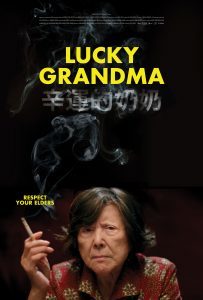
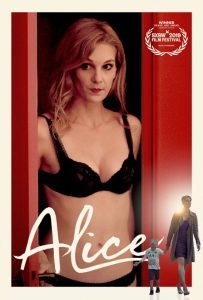
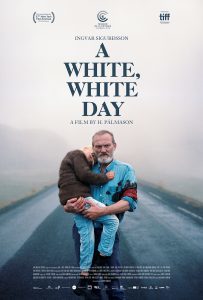

The post This Week in Movies with Meaning appeared first on Brent Marchant.
‘Lucky Grandma’ urges us to know when to step back
“Lucky Grandma” (2019 production, 2020 release). Cast: Tsai Chin, Corey Ha, Michael Tow, Woody Fu, Yan Xi, Wai Ching Ho, Eddie Yu, Ali Ahn, Mason Yam, Emma Ming Hong, John Tan, Zilong Zee, Lyman Chen, Arden Wolfe, He Jun Miao. Director: Sasie Sealy. Screenplay: Angela Cheng and Sasie Sealy. Web site. Trailer.

Turning away from a good thing can be hard to do. The seductive nature of good fortune can be difficult to back away from, especially once we’ve had a taste of it. But over-imbibing can have its drawbacks, sometimes more dire than anticipated, leading to all kinds of unpleasant consequences. Such is the case for a lucky streak run amok in the raucous new Chinese-American comedy, “Lucky Grandma.”
For Grandma Wong (Tsai Chin), a longtime resident of New York’s Chinatown, life hasn’t been easy. She and her husband spent many years toiling to make ends meet, an experience that hardened the feisty, chain-smoking matron to the often-unfair ways of the world. But even that background hasn’t fully prepared her for her present circumstances. Now that she’s in what are supposed to be her golden years, a time to finally kick back and relax, she’s doing it alone, her spouse having recently died. Her son, Howard (Eddie Yu), would like her to move in with him and his family in suburbia, but she sees that as nothing more than just a new set of limitations not unlike what she has experienced throughout much of her life.
To see what the stars have to say, Grandma Wong decides to visit Lei Lei (Wai Ching Ho), a fortune teller. Much to her surprise, Grandma learns that a streak of unbelievable good luck awaits her in the near future. Lei Lei says that everything points to endless abundance and boundless good fortune, even if adverse forces try to impinge upon her. So, armed with that advice, Grandma decides to throw caution to the wind and see what happens. She withdraws all the funds from her bank account, hops on a charter bus and heads for a Connecticut casino. And, just as Lei Lei predicted, Grandma can do no wrong when it comes to her wagering, amassing a small fortune. Alas, things fall apart when she places a bad bet – and loses everything.
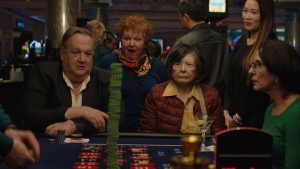
While paying a visit to a Connecticut casino, Grandma Wong (Tsai Chin, seated, second from right) can do no wrong when placing her bets in director Sasie Sealy’s delightful new comedy, “Lucky Grandma.” Photo courtesy of Eduardo Mayén, Good Deed Entertainment and Kino Lorber.
On her way back to New York, Grandma sulks over her losses, a condition made more irritating by the man sitting in the seat next to her, who keeps slumping over on top of her. She soon discovers, however, that he isn’t sleeping; he’s dead, having apparently expired from a heart attack. And, not long thereafter, when the bus makes a sudden stop, a duffel bag from the overhead rack drops down and lands in her lap – literally. It turns out to be the dead man’s bag, and it’s filled with cash, even more than she lost on her ill-fated bet. So, with her luck apparently still holding, upon arrival back in New York, she quietly slips off the bus, taking the bag with her.
What Grandma doesn’t realize, however, is that the dead man sitting next to her was Mr. Lin (He Jun Miao), bookkeeper for the Zhangliong street gang, a criminal organization currently at war with the rival Red Dragon gang. She learns of this when she comes home from a Chinatown shopping spree and finds her apartment ransacked by two Red Dragon members, Little Handsome (Michel Tow) and Pock-Mark (Woody Fu). They question her about the money, suspecting she’s got it well hidden someplace. But Grandma plays dumb, drawing on her street smarts to bluff her way out of the situation (not an especially difficult task given the dimwitted nature of her uninvited guests). Still, despite her seemingly convincing cover story, the henchmen leave her with a stern warning before they depart, a threat that causes Grandma to realize she needs professional protection.
In short order, Grandma seeks out the services of a bodyguard from a local protection racket. After some dickering about the price and the personnel with Lao Shei (Zilong Zee), the head of the outfit, she settles on hiring Big Pong (Corey Ha), a somewhat daft, seemingly gentle giant who nevertheless knows how to throw around his muscle when circumstances warrant. The unlikely duo quickly grows close, with Grandma offering her cohort sage advice on par with the protection he affords her. However, during their time together, she learns of his affiliation with Zhangliong. Through the grapevine, she also learns about the gang’s leader, Sister Fong (Yan Xi), a cunning, ruthless criminal who’s not afraid of cutting deals – or throats – to get her way. And, with Grandma secretly holding the Zhangliong money she took from Mr. Lin, she now faces the prospect of two sets of criminal elements pursuing her, including one linked to her personal bodyguard. At this point, she has to ask herself, how much longer will her luck hold out?
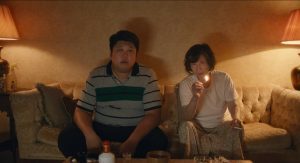
The unlikely duo of Grandma Wong (Tsai Chin, right) and her sometimes-clueless bodyguard, Big Pong (Corey Ha, left) develops an unexpected bond while trying to stay ahead of two rival Chinese street gangs in the hilarious new comedy, “Lucky Grandma.” Photo courtesy of Eduardo Mayén, Good Deed Entertainment and Kino Lorber.
Given the life she’s led, Grandma is ready for a break, eager to be cut some slack. For all she’s done, she justifiably feels like she’s owed something, that it’s time for a little good luck (or, in her case, a lot of good luck). And, as the fulfillment of Lei Lei’s prediction demonstrates, Grandma indeed gets her wish. Even though her streak of good fortune runs counter to what she has typically experienced over the years, on some level she definitively staked an intent for that to change, making it perfectly clear that she wanted something different for herself now, the evidence of which is apparent in her newfound overflowing abundance.
So how did this all come about, especially since it’s so unlike Grandma’s track record? From the presence of a Buddhist altar in her living room, it’s obvious Grandma is quite a person of faith, trusting the divine spirit to aid and protect her, to help make her wishes and dreams come true. And that collaboration is at the core of her good fortune. By confidently staking her intent and firmly believing in its materialization with the aid of her celestial partner – God, Buddha, the Universe or whatever one wants to call it – Grandma now finds herself rolling in dough. This is the kind of alliance that drives the conscious creation process, the philosophy that maintains we manifest the reality we experience through the power of our thoughts, beliefs and intents working in conjunction with the power of our divine collaborator.
Even if Grandma is unfamiliar with the philosophy itself, it’s obvious she understands its principles and knows how to make them work. Evidence of what’s about to unfold is present through all of the divining tools Lei Lei uses, and the message is so clear that she can’t help but interpret it any other way. And, once Grandma is informed of the message, she confidently embraces it, immediately taking steps to bring it into being by cashing in her life savings and heading for the casino. What’s more, her wish materializes so solidly that, even when she thinks she’s lost everything, her luck continues. That’s quite a confirmation.
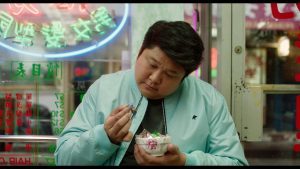
A somewhat-daft gentle giant who knows how to throw his muscle around, bodyguard Big Pong (Corey Ha) shields a crafty grandmother from criminal elements in “Lucky Grandma,” now available for first-run online streaming. Photo courtesy of Eduardo Mayén, Good Deed Entertainment and Kino Lorber.
Of course, in our exhilaration over the fulfillment of our intents, we mustn’t lose perspective, either. When the Universe provides us with what we’re looking for, we must be careful not to push it too far, for that can lead to all kinds of unintended side effects. For instance, when Grandma had amassed a huge fortune at the casino, she should have considered walking away once it materialized. By holding out for more, perhaps even getting a bit greedy, Grandma gave her divine collaborator another (and unwarranted) good shove, risking everything and losing it all. Likewise, when she made up for that loss with the windfall that fell squarely in her lap, she also opened herself up to all of the consequences she subsequently experienced. And on and on it went for the duration of her story. All of which goes to show, as practiced conscious creators are well aware, the Universe naturally leans in our direction, so there’s no need to push it to get our way.
This, in turn, illustrates the inherent responsibility associated with the conscious creation process. Since the intents we seek to be fulfilled originate with us, we have an innate accountability for what happens, both in their initial manifestation and their subsequent consequences. All the trouble that results from Grandma swiping Mr. Lin’s bag, for instance, stems from her, for she’s the one who set the process in motion. It’s unclear what might have happened if she had just stepped forward and returned the cash, but, as gang leader Sister Fong acknowledges in a seemingly chance encounter with Grandma, she’s not above cutting deals when they suit her needs. Of course, consorting with criminals may not be the wisest course, either, but an equitable agreement reached to avoid further trouble might have been preferable to all of the other fallout that occurred.
Still, even when things go terribly awry, they often have a way of working themselves out for the best. Again, this rests with honoring our intents, having faith that they’ll materialize as hoped for, trusting our divine collaborator to see to the fulfillment of our wishes and knowing when to apply the brakes. Under such circumstances, we’re likely to find ourselves sitting exactly where we want to be. Indeed, maybe there’s hope for Grandma yet.
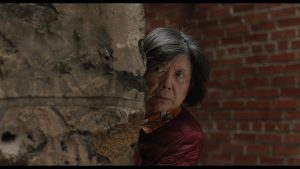
On the run from two rival street gangs, feisty, chain-smoking Grandma Wong (Tsai Chin) finds herself having to maneuver the back alleys of New York’s Chinatown in director Sasie Sealy’s feature film debut, “Lucky Grandma,” now available for first-run online streaming. Photo courtesy of Eduardo Mayén, Good Deed Entertainment and Kino Lorber.
Despite a slight tendency to meander late in the second half, this smartly written, consistently hilarious comedy comes up a winner on many fronts. This send-up of cheesy Chinese crime dramas, mixed with touches of understated wit and campy humor, makes for a warm, funny and touching tale, with an excellent, award-worthy lead performance by Tsai Chin and a fine supporting cast. Director Sasie Sealy’s feature film debut is easily one of the most humorously entertaining offerings to come along in quite some time. See it on first-run online streaming.
We’re all aware of what can happen when we experience too much of a good thing. The process of reaching that point may have its moments of unbridled pleasure, but the resulting aftereffects may be more than we want to handle. So, when “last call” comes up – no matter what the context – we’d be wise to abide by it, for it can save us considerable discontent afterward. And that’s a pretty safe bet.
Copyright © 2020, by Brent Marchant. All rights reserved.
The post ‘Lucky Grandma’ urges us to know when to step back appeared first on Brent Marchant.
June 6, 2020
‘A White, White Day’ traverses the obscure fringes of reality
“A White, White Day” (“Hvítur, hvítur dagur”) (2019 production, 2020 release). Cast: Ingvar Eggert Sigurðsson, Ída Mekkin Hylnsdôttir, Hilmir Snær Guðnason, Sara Dögg Ásgeirsdôttir, Björn Ingi Hilmarsson, Elma Stefania Agustsdottir, Haraldur Stefansson, Laufey Elíasdôttir, Sigurður Sigurjônsson, Arnmundur Ernst Björnsson, þor Hrafnsson Tulinius. Director: Hylnur Palmason. Screenplay: Hylnur Palmason. Web site. Trailer.
Feeling unsettled is one of the worst frames of mind in which we can find ourselves. We know something is genuinely disturbing us, but we can’t pinpoint exactly what. We might become restless or ornery and not even be able to say why. And, try as we might to determine the cause of this malaise, we’re often still left without an answer – that is, until we look deeper and beyond what we think is the cause, probing territory we hadn’t planned on (and may not want to do). Such is the case for a quietly troubled widower in the mystifying new drama, “A White, White Day” (“Hvítur, hvítur dagur”).
For those living in the small towns along Iceland’s seacoast, there are times when the fog descends to the ground, creating a murky, ethereal world bathed in white. Under such conditions, the environment takes on a decidedly surreal quality, one in which we may be puzzled by what surrounds us, leaving us unsure of where the reality we believe we know ends and an entirely new and different one begins. In fact, as the film’s opening graphic, attributed to an unknown source, observes, “On such days when everything is white, and there is no longer any difference between the earth and sky, then the dead can talk to us, who are still living.”
Such is the seemingly everyday experience of Indimunder (Ingvar Eggert Sigurðsson), a policeman on leave from his duties. He’s attempting to sort out his feelings about the recent death of his wife (Sara Dögg Ásgeirsdôttir), who was killed in a car accident on a coastal highway. He’s noticeably unsettled but not entirely sure why. He participates in regular therapy sessions with a counselor (þor Hrafnsson Tulinius), but they don’t seem to help much, partly because the therapist’s questions don’t get to the heart of the matter, but mostly because Indimunder has walled himself off from the world.
Indimunder’s inscrutable moods and tight-lipped demeanor offer few clues about his current mindset, frustrating those who care about him and are trying to offer help. In fact, his coping mechanisms seem to consist mostly of doing home renovation work, playing soccer, and visiting the police station to see fellow officers Bjössi (Sigurður Sigurjônsson) and Hrafn (Arnmundur Ernst Björnsson), engaging in minimalist conversations that consist of little more than small talk. It’s hard to see how any of this gives him any comfort, let alone joy; in fact, about the only thing that seems to lift his spirits is spending time with his young granddaughter, Salka (Ída Mekkin Hylnsdôttir).
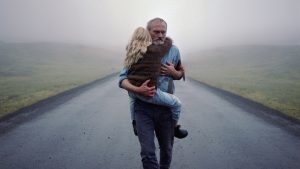
Icelandic policeman Indimunder (Ingvar Eggert Sigurðsson, standing) experiences a crisis of conscience while in the company of his granddaughter, Salka (Ída Mekkin Hylnsdôttir, back to camera), in attempting to overcome the loss of his wife in director Hylnur Palmason’s award-winning release, “A White, White Day” (“Hvítur, hvítur dagur”). Photo courtesy of Film Movement.
Little changes in Indimunder’s life until the evening of a family gathering, when relatives give him a recently discovered box of his deceased wife’s belongings. When he later peruses the contents of the box, he finds items that trouble him, many of which suggest that his wife had been having an affair with Olgeir (Hilmir Snær Guðnason), one of his soccer colleagues. The evidence initially appears somewhat circumstantial, but, when he finds something more conclusive, Indimunder begins a quiet slowburn. He starts melting down, engaging in progressively more troubling and obsessive behavior, particularly in his therapy sessions, in visits with his police colleagues and even in the time he spends with Salka. Others seriously begin to worry that he’s losing it, especially when he finally confronts Olgeir.
Ironically, however, as matters play out and things appear to spin out of control, the blockages that have kept Indimunder from healing at last begin to clear. It’s a painful process, to be sure, yet it gives him the tools he needs to discover why he’s withdrawn and has been unable to overcome his loss – issues that have more to do with him than with the circumstances involving his wife. But, then, such miraculous revelations become possible on a white, white day in coastal Iceland.
For much of the film, Indimunder comes across like an enigma, both to others in the story, as well as those in the audience. Something is obviously troubling him from the outset, and the emergence of his suspicions about his late wife’s affair provides some clues. However, given the growing nature of his erratic and irrational behavior – some of which is punctuated by fits of uncharacteristic emotional outbursts – there’s clearly more going on in his mind, much of which even he doesn’t seem to grasp or understand. True, he’s genuinely sad about his wife’s death, not to mention the apparent betrayal that didn’t surface until after her passing. But the degree of his irrationality and emotionalism suggests there’s more to it than that. Sadly, though, none of his actions and reactions get him any closer to a resolution of his grief or a satisfactory explanation for his profound unsettledness.
As Indimunder slowly comes to realize, the answers to his questions lie within him, but he must be willing and committed to peer inward to find them. In particular, he must examine the beliefs that drive his outlooks on what has transpired and why. But this also calls upon him to look at the role he played in their origination and establishment, for the resulting circumstances originated with his thoughts, beliefs and intents, the intangible building blocks of the conscious creation process, the philosophy that maintains we draw upon these resources in creating our reality.
Since Indimunder apparently doesn’t know how to go about this (most likely because he’s never heard about conscious creation before), he’s perpetually frustrated. And this frustration leads to the irrational behavior and emotional outbursts that result – and continually grow in intensity. If he ever hopes to get past the current state of affairs, he’ll have to figure out how to access, assess and understand what’s going on with him.

The murky white landscape of coastal Iceland provides a surreal setting for Indimunder (Ingvar Eggert Sigurðsson, right), a policeman on leave from his job, as he and his granddaughter, Salka (Ída Mekkin Hylnsdôttir, left), seek to work out a personal crisis in “A White, White Day” (“Hvítur, hvítur dagur”), now available for first-run online streaming. Photo courtesy of Film Movement.
In a sense, Indimunder needs to clear the fog that’s clouding his view, conditions that are metaphorically present in the surrounding environment. There’s a considerable amount of camouflage – both literally and figuratively – obscuring his perceptions, preventing him from seeing things clearly. However, in a setting like this, one also has greater opportunities for perusing the intangible and otherworldly, the stuff of which things like thoughts, beliefs and intents are made of. Such conditions thus make it possible to interact with that which we might not otherwise have contact in the bright light of a clear day. It’s as if the statement in the film’s opening graphic comes to life, facilitating the manifestation of events, realizations and insights that might not otherwise occur. And, in such a scenario as this, it’s possible that someone like Indimunder could start to identify the answers he’s looking for. The onetime lost lamb suddenly becomes a seeker, one who’s able to discover truths that have previously eluded him.
Once armed with such knowledge, anyone who takes this step must realize how imperative it is to search for our authentic selves, because it’s within them that our most significant answers reside. A thorough understanding of the nature of one’s authentic self can be tremendously revealing, especially when it comes to recognizing and appreciating why our existence unfolds as it does. Without such clarity of thought, it’s easy to contend that our reality is something that emerges at random, out of our control, with consequences that appear as a result of people, forces and things outside of ourselves. However, if we believe in the validity and power of conscious creation, we also come to see how such viewpoints are excuses, rationalizations for being unwilling to accept our role in the manifestation process and the inherent responsibility that accompanies it. Indeed, we might not like what we see, which means we must be painfully forced into accepting that there’s something about ourselves we don’t like as well. However, without such acceptance, circumstances will likely remain as they are – unfulfilling, unalterable and unyieldingly intractable – until we’re willing to do otherwise. That can be a high price to pay for foolhardy stubbornness and unrelenting denial.
Fortunately, breaking through such blockages carries tremendous benefits. It can relieve the persistent pressure we may have been feeling, allowing us to rid ourselves of beliefs that no longer serve us, as well as the unpalatable fallout, dissatisfaction, disappointment and unfulfilling emotions that often accompany them. We can rewrite our thoughts, beliefs and intents to take forms that are more fruitful, providing us with access to opportunities that may have been blocked off from us or that we had been fundamentally unable to fathom. It can transform past hurts into successful healings, as well as enable us to see ourselves – including our authentic selves – in an entirely new light. And there’s no telling what that might help make possible. But, in Indimunder’s case, there’s a good chance that he could be on the verge of finding out.

This gorgeously filmed, well-acted Icelandic tale of loss, romance and betrayal presents its story in subtle but novel ways, with ample symbolic references that cleverly reinforce the thrust of the narrative. Director Hylnur Palmason, handily a rising star, inventively tells his tale in intriguing ways, such as effectively letting his cinematography do the talking in place of words, a technique from which other filmmakers could learn a lot. Admittedly, the picture meanders somewhat in the middle, taking a little longer than needed to pin down what it’s trying to say. A little tidying up, slightly quickened pacing and greater emphasis on its core underlying message would have worked wonders to make a good film an even better one.
“A White, White Day” has not gone unrecognized in cinema circles. At the 2019 Cannes Film Festival, the film was named the winner of the Louis Roederer Foundation Rising Star Award, as well as a nominee for the Critics’ Week Grand Prize. It has also picked up a number of honors and nominations at other film festivals. In addition to its screenings on the festival circuit, the film is now available for first-run online streaming.
The prospect of surveying the uncharted territory of our consciousness may intimidate many of us. But, just as exploratory surgery is sometimes necessary to uncover hidden illnesses, the same is true for exposing the inner troubles that remain out of sight and keep us in a distressed state. The longer we put off the process, the more painful it can become over time, often resulting in more anguish than what would come from just taking the plunge to uncover the source of the discomfort. What we find may surprise or even shock us, but what we frequently get from such a discovery is much-needed relief, the kind that allows us to leave the past behind and move forward into a promising new future. Getting the fog to lift may take some effort, but the change that comes from it is all too clear.
Copyright © 2020, by Brent Marchant. All rights reserved.
The post ‘A White, White Day’ traverses the obscure fringes of reality appeared first on Brent Marchant.
June 5, 2020
‘Alice’ colorfully examines the process of starting over
“Alice” (2019 production, 2020 release). Cast: Emilie Piponnier, Martin Swabey, Jules Milo Levy Mackerras, Chlöé Boreham, Ariana Rodriguez Giraldo, Juliette Tresanini, Christophe Favre, Philippe de Monts, David Coburn. Robert Burns, Marie-Laure Dougnac, Marie Coulonjou, Marine Blake (voice). Director: Josephine Mackerras. Screenplay: Josephine Mackerras. Web site. Trailer.
Life sure seems unfair at times. We may think we’ve got it made when, all of a sudden, everything evaporates before our very eyes. We might be shattered (and rightfully so), unsure of where to turn next. However, such a turning point could be one of the best things to ever befall us, a scenario explored in the new French domestic drama, “Alice.”
From all appearances, Alice Ferrand (Emilie Piponnier) leads a stable, contented, reasonably happy life. The young Parisian wife and mother keeps a busy schedule tending to the needs of her husband, François (Martin Swabey), and their young son, Jules (Jules Milo Levy Mackerras), as well as helping out others, such as her friend, Carole (Juliette Tresanini), but things overall seem generally pleasant.
However, that all disappears one morning when she attempts to use her credit cards and to obtain funds from an ATM: All of her transactions are turned down. Alice frantically calls François to see if he knows anything about this, but she keeps getting his voicemail, leaving messages that are never returned. And, when she checks with her financial institutions, she learns that her husband has withdrawn large amounts of cash and failed to make payments on their debts for months. With no money in hand, the threat of eviction looming and no response from François, the young mother with a high-maintenance toddler in tow is clearly up against it – and no idea how to move forward.

Parisian wife and mother Alice Ferrand (Emilie Piponnier, background) cares for her young son, Jules (Jules Milo Levy Mackerras, foreground), before taking a radical career turn in the new French domestic drama, “Alice.” Photo courtesy of Monument Releasing.
To make matters worse, all of the resources Alice thought she could count on for help turn a blind eye. In a painful phone call to her mother (Marine Blake), Alice explains her situation, but mom shows little sympathy, even taking François’s side, suggesting that her daughter isn’t working hard enough at her marriage – and probably not doing enough to keep her husband “satisfied.” Whether or not accurate, that last sentiment proves rather uncanny, especially when Alice discovers that most of the missing funds have been paid out to a company called Elegant Escorts. François, it seems, has been engaging the services of expensive prostitutes for months, so much so that it has depleted the couple’s financial resources.
When Alice contacts the escort service, the company’s owners, Véra (Marie-Laure Dougnac) and Jessica (Marie Coulonjou), offer little information over the phone, but they invite their caller to attend their offices for their next group audition. Desperate for answers, Alice accepts the invitation to find out whatever she can. But, much to her surprise, in the wake of her appearance at the audition, the beautiful young mother learns that the owners would like to bring her on board as one of their girls. Alice doesn’t initially know how to react, but, when she learns of the kind of money she can make – more than enough to bail her out of her financial woes and to adequately support herself and Jules – and considering the hurt François caused her, Alice figures, “Why not?”
Given that she’s new at this sort of thing, Alice starts off somewhat comically and clumsily, but, thanks to an understanding first client (Philippe de Monts), she manages to work her way through it and get paid. And, with tips from Lisa (Chlöé Boreham), one of her escort peers who has become quite proficient at her craft, Alice hones her skills as well, quickly amassing a bundle that helps her pay off her debts. She even seems to enjoy what she’s doing, relishing the liberation that this new line of work has provided her.

When Alice Ferrand (Emilie Piponnier, left) learns that her philandering husband, François (Martin Swabey, right), has depleted the family funds by engaging the services of high-end escorts, she seeks retribution in multiple ways in director Josephine Mackerras’s feature film debut, “Alice.” Photo courtesy of Monument Releasing.
But, just when things start going well for the first time in a while, she’s hit with another bombshell – François returns, admitting his guilt and looking to reconcile. He begs Alice to forgive him for the foolishness of his ways, that he desperately misses her and Jules. However, having now had a taste of freedom and realizing that she no longer needs her husband in her life, she resists nearly all of his attempts at conciliation. Admittedly, she’s willing to avail herself of his assistance when she needs a babysitter to take care of Jules when she needs to go out on a call, sincerely believing that he owes her. But, unfortunately, that sends the wrong message, giving François false hope for the future – and opening the door to nasty prospects that threaten to undo all the progress Alice has made, not to mention wiping away all of her newfound happiness.
When Alice initially uncovers what’s unfolding in her life, she’s understandably devastated. In a matter of hours, everything she had come to believe about her daily existence was wiped away, leaving her not knowing what to think. To be sure, such an unanticipated downfall is nothing to be minimized. However, at the same time, it also represents a tremendous opportunity, to start with a clean slate and begin anew. And the promise and potential behind that all rests with Alice herself; given that the beliefs she held constituted the basis for her old existence, it stands to reason that whatever new beliefs she chooses to embrace will do the same for the new one she manifests for herself. It’s an outcome made possible by the conscious creation process, the philosophy that maintains we materialize the reality we experience through the power of our thoughts, beliefs and intents.
Because conscious creation innately makes anything possible, all outcomes are essentially fair game. With a limitless palette of belief options available to her, Alice can choose virtually anything she wants for a fresh start. Considering what she recently experienced, it may not be easy to view her circumstances in this light. However, if she (or anyone, for that matter) can see such an opportunity for what it is, unburdened by the weight of emotional baggage, the world truly could be her oyster (though, given her zeal and proficiency for her new line of work, oysters probably aren’t necessary).

With help from her friend and professional peer, Lisa (Chlöé Boreham, left), housewife-turned-escort Alice Ferrand (Emilie, Piponnier, right) discovers a newfound sense of freedom and happiness in the new French domestic drama, “Alice.” Photo courtesy of Monument Releasing.
Nevertheless, just because Alice is embarking on her new life, that doesn’t mean the rules governing conscious creation don’t apply. This is particularly true where it comes to matters of responsibility. After all, given that everything we create comes from us and our beliefs, it also means that we bear the responsibility for whatever we materialize, including whatever fallout, side effects and consequences result. We can clearly see what comes from that, for example, in François’s case: The beliefs and intents underlying the fulfillment of his sexual needs indeed brought him the carnal pleasure he sought, but it carried an enormous price. And, in the wake of his loss, he was left broke and without the wife he loved more than he ever realized. (Such is the dual-edged sword that acts of creation can sometimes be.)
Alice has responsibility issues to cope with in light of her new belief choices, too. Most notably there’s the caretaking of her son; after all, dragging one’s child along on an out call doesn’t leave the best impression, so alternate accommodations must be put into place to attend to everyone’s needs. And then there are the inherent risks of her profession itself, conditions that could expose her to all sorts of difficulties from legal, health and reputational standpoints. Of course, all of these concerns can be addressed by incorporating suitable beliefs up front, intents that cover whatever needs to be tackled, minimized or avoided. Preparing for these kinds of contingencies at the outset is in itself a responsible act, one that can stave off unwanted consequences.
Alice’s decision to become an escort may not be everyone’s choice, especially in light of some of the concerns noted above. However, considering what she was up against, she had to take drastic measures to escape her circumstances. This required her to break through limitations, to seek solutions that brought her what she needed, no matter how unconventional they might seem to others – or how they even might have seemed to her at one time. Alice’s novel approach thus suitably fulfilled her material needs. It also probably didn’t hurt that it provided her with a certain degree of self-satisfaction in being able to turn the tables on François by giving him a taste of his own medicine.
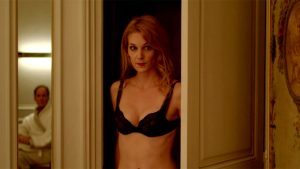
After a challenging start as a high-end escort, Alice Ferrand (Emilie Piponnier, right) develops a proficiency for her craft in “Alice.” Photo courtesy of Visit Films.
What’s even more remarkable, though, are the unforeseen benefits that come out of Alice’s decision. For instance, after spending some time in her new line of work, she discovers feelings of liberation and personal fulfillment, qualities that weren’t present (at least to the same degree) during her days as a wife and mother. At the same time, she also discovers an unexpected capacity to give joy to those in need of it, such as some of her clients (David Coburn, Robert Burns), some of whom are even able to return the favor when the need arises. But, most importantly, Alice’s new life provides her with a newfound sense of personal empowerment. And, with an awareness of a quality like that, there’s no telling what she (or any of us) might be able to create with it.
This innovatively empowering, warm and sometimes-funny tale hits most of the right notes, albeit a tad predictably at times. The premise of this domestic drama may seem a bit far-fetched for some (even though it is very French), but its inventive narrative is certainly thought-provoking in its own way. With a fine lead performance by Emilie Piponnier, atmospheric cinematography and an excellent original score, director Josephine Mackerras’s feature film debut serves up an entertaining and evocatively offbeat source of inspiration. “Alice” is currently available for first-run online streaming.

The sourness of the lemons life sometimes hands us can leave more than just a bad taste in our mouths. However, sugar is easy to find to transform those acrid juices into something delicious. We just need to keep our eyes open and know where to look. Alice Ferrand certainly knows how, and we could learn a lot by following her example so that, when the time comes, we’ll know just what to do to drink up and enjoy.
Copyright © 2020, by Brent Marchant. All rights reserved.
The post ‘Alice’ colorfully examines the process of starting over appeared first on Brent Marchant.
June 2, 2020
Coming of Age on The Cinema Scribe
Tune in for the latest Cinema Scribe segment on Bring Me 2 Life Radio, today, June 2, at 2 pm ET, by clicking here. And, if you don’t hear it live, catch it later on demand, with new listening options available! In addition to Spreaker, the show is now available on iHeart Radio, Spotify, Podcast Addict and Podchaser!

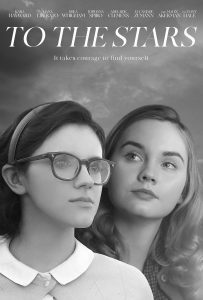
The post Coming of Age on The Cinema Scribe appeared first on Brent Marchant.
May 28, 2020
This Week in Movies with Meaning
Reviews of “To the Stars” and “Far From the Tree,” as well as a look back at a sci-fi classic, are all in the latest Movies with Meaning post on the web site of The Good Media Network, available by clicking here.

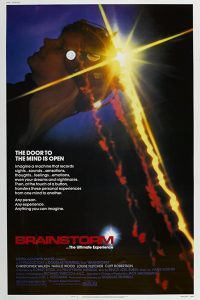

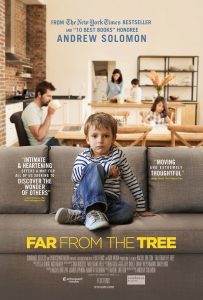

The post This Week in Movies with Meaning appeared first on Brent Marchant.
May 27, 2020
‘Far From the Tree’ explores the extension of our roots
“Far From the Tree” (2017 production, 2018 release). Cast: Andrew Solomon, Jason Kingsley, Emily Perl Kingsley, Jack Allnutt, Amy Allnutt, Bob Allnutt, Loini Vivao, Leah Smith, Joseph A. Stramondo, Howard Solomon, John Habich Solomon, Derek Reese, Lisa Reese, Tyler Reese, Rebecca Reese, Charles Kingsley (archive footage). Directors: Rachael Dretzin and Jamila Ephron. Book: Andrew Solomon, Far from the Tree. Web site. Trailer.
When a couple settles down to start raising children, the parents-to-be generally assume that everything is going to turn out “normal,” that their hopes and wishes for the typical “mainstream” family are going to materialize free of challenges and difficulties. But what happens when things don’t pan out as expected? Significant differences in any number of areas, from physical attributes to emotional temperaments to sexual orientation, can knock parents for a loop, leaving them to wonder what can or should be done for their offspring – if anything at all. That’s the question posed in the engaging 2017 documentary, “Far From the Tree,” available for home viewing.
When gay author Andrew Solomon was growing up, he knew his sensibilities were different from those of other boys his age. The things that typically interested his peers held no appeal for him. And, as he grew older, he also realized this carried over into the area of sexuality. He wondered why he was different and often fretted over his attraction to members of the same gender, even going so far as to look for solutions to change his ways, such as paying visits to female sex workers in hopes that they would be able to “convert” him. Alas, though, nothing worked, and he realized his only choice was to accept or deny his orientation; change was not an option.
Solomon took the bold move to accept himself and be open about it, a risky venture during a far less tolerant time. It initially cost him his relationship with his parents, especially his mother, Carolyn, who drilled the notion into his head that he would never be happy, mainly because of the inherent “instability” of gay relationships. Nevertheless, Solomon stayed with his decision and sought to make his way in the world.

During his process of self-discovery, Solomon asked himself how he could end up so unlike the family into which he was born. But, the more he pondered this question, the more he expanded his inquiry into differences of other kinds, be they emotional, physical or behavioral. How did the parents and families of children who exhibited such other distinctions handle their situations? Did they view their kids’ conditions as “differences” or “disabilities”? Did they see their sons and daughters as saddled with handicaps, or were their children posed with challenges to address and overcome? Indeed, as Solomon himself put it, were these deviations from the norm meant to be looked upon as things to be fixed or celebrated?
It was with those questions in mind that Solomon set about to write what would eventually become the best-selling, much-applauded nonfiction title, Far from the Tree, the book that formed the basis for this documentary. In addition to exploring his own personal odyssey, his book and this film examine the special needs and circumstances of children who turned out vastly different from their parents and siblings. Through these cinematic and literary channels, author Solomon and filmmakers Rachel Dretzin and Jamila Ephron address the experiences of families affected by children with Down syndrome, autism, dwarfism and criminality. The result is a series of remarkable stories in which the challenges were great and hard-fought solutions took considerable effort to be realized – but often with inspiring results. These apples may have fallen, bounced and rolled considerable distances from their boughs, but the fruit is in many respects just as ripe.
Consider, for example, the experience of Jason Kingsley, who was born with Down syndrome. At the time of his birth, his mother, Emily, was advised to give up the child and have him committed to a special facility, essentially out of sight and away from public view. Emily’s health care providers explained that Jason wouldn’t have much of a life, unable to learn and to interact with society in the same way that other children do. It was widely believed that their suggested solution – the standard at the time – would remove the “burden” of trying to raise a child with such a condition, easing life for Emily and her husband, Charles.

Born with Down syndrome, Jason Kingsley (right) has achieved much in his life, thanks to the tireless efforts of his mother, Emily (left), as seen in the excellent 2017 documentary, “Far From the Tree,” available for home viewing. Photo courtesy of Sundance Selects.
Emily and Charles, however, would have none of that. They didn’t buy into the idea that Jason was fundamentally incapable of attaining an education; they believed that he could grow up to have a meaningful, productive and contributing life. But, even more important than that, they simply couldn’t abide by the idea of just giving him away. As Emily put it, one doesn’t stop loving a child just because he or she might have a special condition; a parent just doesn’t do that.
And, as it turned out, Emily and Charles were right. Jason mastered subjects that he supposedly wasn’t capable of learning. He even became something of a celebrity, appearing as an actor on episodes of such TV shows as Sesame Street, The Fall Guy and Touched by an Angel, as well as a guest on talk shows. He graduated from high school and a post-secondary school for students with special needs, and he has since gone on to hold a full-time job and live mostly independently with two other Down syndrome housemates.
Jack Allnut has followed a life path in many ways similar to Jason Kingsley. His parents, Amy and Bob, say that Jack’s early life was seemingly normal. But, then, while a toddler, he began to withdraw, unable to speak and often acting out in tantrums. It became apparent that he was autistic, and nothing Jack’s parents did seemed to help – until they met a special therapist who discovered that a remarkable individual resided within Jack. Through an unorthodox treatment technique, the therapist was able to communicate with Jack in a special way. Jack explained that he understood what was going on around him but that he was unable to convey his thoughts through speech, a hindrance that relentlessly frustrated him and prompted much of his behavior. However, with this new channel of communication now open, the Allnut family discovered that Jack was highly intelligent – an aptitude he applied to schooling, achieving exceptional grades in many of his classes.
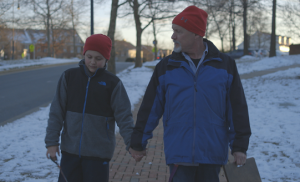
Jack Allnutt (left), who developed autism at a young age, has learned how to manage his condition and become a stellar student thanks to special therapy and the loving support of family members like his father, Bob (right), as chronicled in the documentary “Far From the Tree.” Photo courtesy of Sundance Selects.
Carrying on a “normal” social life and being able to have a family life are difficult when one is half as tall as everyone else. Just ask Loini Vivao, Leah Smith and Joseph A. Stramondo. But that doesn’t mean it’s impossible, either. These three adults who have grown up with dwarfism may not share the same physical attributes as their full-sized peers, but that doesn’t mean they don’t want the same things out of life as their taller counterparts. Their stories are examined in various ways, such as their attendance at conferences and social gatherings organized specifically for them, as well as the determined efforts of husband and wife Joseph and Leah to have a child. The means for addressing their needs may be different in nature from those of Jason and Jack, but the empowering assistance they receive from their respective support resources (particularly family members) is just as significant. And the incalculable impact of all this is meaningful beyond measure for the lives they seek to lead.
For all these success stories, however, some others are painful, no matter how earnestly one tries to address them. Such is the case for the Reese family, whose teenage son, Trevor, was convicted of an inexplicable, brutal murder of a young child. Trevor had what appeared to be a bright future ahead of him until he committed this senseless killing, an incident so shocking and out of character that even the perpetrator doesn’t know why he did it. He pled guilty to the charges, sparing him the death penalty but resulting in a sentence of life in prison.
The fallout in this case has left the family with what is arguably the greatest burden to bear in all of these stories, given that the fruit has fallen farthest from the tree and saddled them with a future that realistically holds the dimmest prospects for change. Parents Derek and Lisa and their other two children, Tyler and Rebecca, picked up and moved out of state in hopes of a new start, but difficulties linger. Derek and Lisa explain that they often find themselves being vague about their past when meeting new people, given that being too candid frequently doesn’t help in forging new friendships. And Tyler and Rebecca have said that they have no desire to become parents, decisions made out of an abundance of caution. The family still communicates with Trevor, trying to offer whatever encouragement they can under these trying conditions. But, given what the Reeses are up against, what more can they do than continually hope for the best for everyone – even Trevor – going forward?
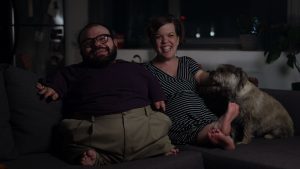
Husband and wife Joseph A. Stramondo (left) and Leah Smith (right) won’t let dwarfism stop them from becoming parents, as detailed in “Far From the Tree.” Photo courtesy of Sundance Selects.
And then there’s Andrew’s story, which, like the others, started out with more than its share of difficulties. Over time, though, with changes in social conditions and greater acceptance of alternate lifestyles, the author has come into his own as a successful writer. He has also forged a happy home life with his husband, John, and their many children. But, perhaps most importantly, Andrew has made peace with his father, Howard, proving that, when it comes to the bond of blood relations, sometimes the distance from the branches doesn’t matter a bit.
At first glance, many might look upon the situations of these families and individuals as tragic. How can one bear up under such conditions? Is there no hope for a fulfilling life? What is one to do?
However, as these stories illustrate, remarkable miracles often come out of such circumstances. Unexpected joys, heartfelt love, tremendous accomplishments and the means to help others often result from such scenarios, and there’s much to be said for that. It may take getting past some well-entrenched social stigmas and inherent challenges, but that does not mean all is lost, especially if one believes to the contrary. And that belief component is crucial, for it drives the conscious creation process, the philosophy that maintains these intangible resources are drawn upon in manifesting the reality we experience.
If that’s true, though, one might rightfully ask, “Why would anyone materialize such arduous conditions in the first place?” That’s a legitimate question given the difficulties involved in handling such situations. But the reasons behind why any of us manifests what we do is our business and not subject to outside scrutiny or judgment, no matter how innately challenging those circumstances are.
In many cases, individuals and families who create such conditions do so to learn particular life lessons, including those that may be difficult to endure. Given that conscious creation makes anything possible, and considering that our being’s greater purpose is to know what it’s like to experience the full range of existence, at some point we may well choose to go through some of these more challenging undertakings. We may not be consciously aware that we have decided to do so, nor may we even be aware of conscious creation as a practice. However, that does not mean we don’t employ it in manifesting the lives we lead, to see what they have to offer (for better or worse), to determine if we’re able to overcome their intrinsic limitations and to explore what our experiences may contribute to the overall human condition. Those are sincerely noble aspirations, and what we experience through these opportunities may truly astonish us and our peers.
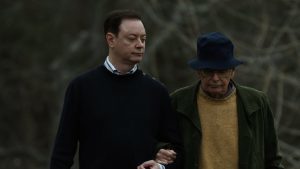
After years of struggles over his sexuality, gay author Andrew Solomon (left) has made peace with his father, Howard (right), as detailed in the documentary “Far From the Tree,” based on the writer’s best-selling, critically acclaimed book of the same title. Photo courtesy of Sundance Selects.
This is especially true when it comes to such undertakings as overcoming fears and pushing past limitations. Through these ventures, we may well see that we’re capable of so much more than we truly thought possible, and this applies to both the individuals directly affected, as well as those around them. By trying out alternate lines of probability, we may end up devising inventive solutions to longstanding difficulties. This can end up benefitting not only us, but also others who are similarly situated. And, in that regard, we may end up doing great services to humanity in the arts, technology, health and well-being, and other areas of endeavor. Conscious creators refer to this as the practice of value fulfillment, that of being our best, truest selves for the betterment of our individual beings, as well as the whole of mankind. Who would think that such innovation could emerge from what many others may offhandedly refer to as “adversity”?
This excellent examination of how individuals and families cope with various challenges that place them outside the mainstream of society enlightens and inspires throughout. While the documentary could use expansion in some areas and judicious snipping in others, the overall production is insightful, especially when it comes to redefining what actually constitutes the meaning of “family,” as well as what conditions need to be encouraged rather than altered or eliminated. “Far From the Tree” is likely to leave viewers with a wide range of impressions that they haven’t considered before. Check it out on DVD or video on demand – you’re sure not to be disappointed.
The lives we lead may not be for everyone. They may deviate significantly from what others believe we should want and from what they have painstakingly prepared for us. But, then, what we bring out of these experiences may end up being immeasurably more uplifting and meaningful, and not just for ourselves. We may like to believe that apples shouldn’t fall far from their trees, but sometimes working in a little distance can prove to be revelatory for us as individuals, as families, and, in the long run, as a species.
Copyright © 2020, by Brent Marchant. All rights reserved.
The post ‘Far From the Tree’ explores the extension of our roots appeared first on Brent Marchant.
May 18, 2020
‘To the Stars’ charts the emergence from one’s shell
“To the Stars” (2019 production, 2020 release). Cast: Kara Hayward, Liana Liberato, Adelaide Clemens, Malin Akerman, Tony Hale, Jordana Spiro, Shea Whigham, Lucas Jade Zumann, Madisen Beaty, Lauren Ashley Stephenson, Sophi Bairley, Tina Parker, Matt Coulson, Natalie Canerday, Doug Jackson. Director: Martha Stephens. Screenplay: Shannon Bradley-Colleary. Web site. Trailer.
Adolescence is seldom an easy time for many of us. It’s an age of exploration and experimentation, a period when we examine the world and ourselves to see how we mesh together. The fit isn’t always exact, though, particularly when our authentic selves differ significantly from what we see around us. It often prompts us to retreat into our shells, sometimes covering our eyes in the process as we struggle to reconcile the discrepancies. But, no matter what coping mechanisms we may employ, coming of age can still be a trying time until we find the key to unlock this especially troublesome door. So it is for a teenager seeking to find herself in the new period piece drama, “To the Stars.”
For a sensitive, misunderstood loner like Iris Deerborne (Kara Hayward), attempting to fit in can be a daily exercise in emotional distress and personal frustration. After all, life in small town Wakita, Oklahoma in the 1950s can be stifling enough in itself, let alone for someone whose outlooks and sensibilities aren’t on the same wavelength as everyone else. The constant pressure to conform, as well as many failed attempts at being like everyone else (and the resulting ridicule that comes from those efforts), have taken their toll, leaving Iris with her share of neuroses. In particular, she suffers from bladder control issues, a condition that has prompted her snarky high school classmates to label her with the insulting nickname “Stinky Drawers.”
It doesn’t help that those around Iris continually reinforce the angst she feels. For example, her mother, Francie (Jordana Spiro), a budding alcoholic who shamelessly flirts with local teenage boys, constantly badgers Iris to improve herself, most notably by looking for ways to land a boyfriend. Mom is lovingly supportive of her daughter but only as long as Iris follows her recommendations; whenever the adolescent seeks to follow her own impulses, Francie’s snarly side comes out, her venomous attitude fueled by a mix of generational jealousy and retribution for rejection of what she believes to be foolproof recommendations.
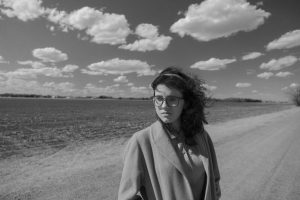
Sensitive, misunderstood loner Iris Deerborne (Kara Hayward) struggles to assimilate into the confining culture of 1950s small town Oklahoma in the new coming of age saga, “To the Stars.” Photo courtesy of Samuel Goldwyn Films.
But the troubles don’t stop at home. Iris is bombarded by even more teasing and mockery at school from a pack of mean girls, the popular, cheerleader types who refer to their little clique as “the Songbirds.” Clarissa Dell (Madisen Beaty), the leader of this spiteful little coterie, dishes out more than her share of hurtful barbs, even advising others that hanging out with Iris is tantamount to social suicide. Her efforts are backed by a pair of minions, Rhonda Robertson (Lauren Ashley Stephenson) and Hattie McCoy (Sophi Bairley), sidekicks who handily get in their fair share of cheap shots and faithfully back their alpha when called upon.
Iris seeks solace by looking for ways to be by herself. She frequently hides out in her bedroom, buried under the covers with a transistor radio plastered against her ear. She also goes for late night swims in a nearby pond, one that most locals avoid given that it was the site of a young mother’s tragic suicide. All in all, it’s a pretty lonely life. In fact, the only people who show Iris any meaningful respect and support are her father, Hank (Shea Whigham), and the family’s teenage farmhand, Jeff (Lucas Jade Zumann), son of the woman who killed herself.
Things take a drastic turn, however, when a new student arrives at Wakita High, Maggie Richmond (Liana Liberato). The urban transplant, who recently relocated to Oklahoma with her family from Kansas City, exudes an air of confidence that allows her to carry herself with authentic self-assurance – and to quickly put the Songbirds and pushy teenage boys in their place whenever the need arises. She also uses this confidence to come to Iris’s rescue whenever she’s being taunted by others, a sort of combination big sister and bodyguard.
Iris is initially perplexed by Maggie’s unsolicited support. Since almost no one has ever come to her defense before, she fails to understand why anyone would have her back. But, the more time they spend together, the more a bond is forged between the two. In addition to protecting Iris from the malicious influences around her, Maggie also helps to bring her shy friend out of her shell. She shows Iris how to change her appearance, providing her with clothing and make-up tips, as well as teaching her how to be more impulsive and in charge of her life. She even takes Iris for a visit to the local beautician, Hazel Atkins (Adelaide Clemens), for a makeover, a transformation that catches the eye of Dad and Jeff and even evokes new reactions from the Songbirds. In fact, the only one who seems unmoved by these changes is Francie, who expresses an undefined mistrust of Maggie; is this because Iris follows her friend’s makeover recommendations over hers, or is there something more behind her suspicion?
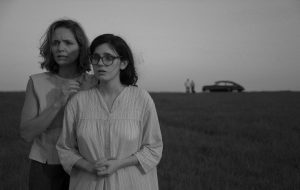
Sensitive, misunderstood loner Iris Deerborne (Kara Hayward, right) seeks to work out her conflicted relationship with her mother, Francie (Jordana Spiro, left), in director Martha Stephens’s latest release, “To the Stars.” Photo courtesy of Samuel Goldwyn Films.
Over time, despite the closeness that Iris and Maggie have forged, a certain inexplicable tension begins to mount between them. Maggie, it seems, is starting to pull away, alienating herself from her parents (Malin Akerman, Tony Hale), attempting to force a relationship with a football player (Matt Coulson) for whom she has no apparent feelings and spending more time with Hazel. To repay all the kindnesses Maggie extended to her, Iris now tries to return the favor to her friend, but she’s met with the sort of mistreatment she once received from others.
What happened? That question’s answered as the film races toward its conclusion. In a curious mix of surprises and predictability, the characters play out their story, one that in some ways rockets out in new directions while simultaneously coming full circle. The protagonists may reside in Oklahoma, but their journey also takes them someplace more magical – to the stars.
At the outset of this story, one can’t help but look upon Iris and sigh “Poor girl.” She’s desperately struggling to navigate choppy waters in which she’s given precious little opportunity to be herself. Her outcast ways repeatedly place her in difficult circumstances from which there is seemingly no escape. And, the more they recur, the more exasperating it becomes to extricate herself from them. What is she to do?
As vexing and menacing as this situation is, and as troubling as the actions of those around her are, Iris herself also plays a role in her tribulations by unwittingly allowing those conditions to persist. She has firmly come to believe in the negative nature of her circumstances to such a degree that she can’t see her way past them. And that’s attributable to the conscious creation process, the philosophy that maintains we draw upon those metaphysical resources to manifest the existence we experience. Even if Iris has never heard of this practice (which, in all likelihood, she hasn’t), she nevertheless consistently draws upon it to create – and reinforce – the reality around her.
Obviously Iris needs a way out to turn things around, but where does she begin? She likely isn’t aware of the power of her beliefs and what they’re manifesting, let alone how to change them to something preferable. Yet she also recognizes, even if in unspoken solitude, that she’s not allowing her true, authentic self to shine through. Without a clue on how to proceed in altering her existence, she seeks to latch on to some kind of catalytic spark to help show her how.
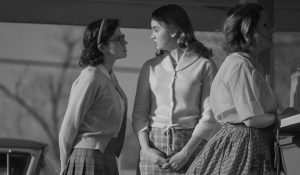
Urban transplant Maggie Richmond (Liana Liberato, center) strikes up an unusual friendship with sensitive, misunderstood loner Iris Deerborne (Kara Hayward, left) when the city girl moves to small town Oklahoma in “To the Stars.” Photo courtesy of Samuel Goldwyn Films.
Enter Maggie. In a relatively short time, the newcomer opens Iris’s mind to possibilities that she hadn’t previously considered. This empowers the wallflower to explore new options and to develop the self-confidence necessary to bring them into being. It’s as if a lightbulb flashes on, enabling Iris to tell herself “I can do that,” a realization she’s never contemplated, let alone embraced, before. Almost overnight, Iris goes through a transformation unlike anything she’s ever experienced.
Key to this is Iris giving herself permission to rewrite her beliefs. She decides it’s time to come out of her shell, to start participating in life more fully than she ever has. It enables the authentic Iris to surface, the one who gives her life meaning, satisfaction and fulfillment, no matter how counter it runs to the lives and expectations of others around her. Indeed, it represents a far cry from her past self.
Interestingly, this alteration to Iris’s reality echoes outward to those around her. Once she’s developed the confidence to change her circumstances, she feels empowered to help others do the same. For instance, the example she sets helps to evoke new and different reactions toward her from the Songbirds, as well as to unexpectedly turn Jeff’s head. Iris even feels capable enough to try and help her mentor when she experiences emerging challenges, even if she doesn’t fully understand what her friend is going through. That’s quite a turnaround, to be sure.
The evolution Iris undergoes also illustrates one of conscious creation’s cornerstone principles – that everything is in a constant state of becoming. Thankfully, that’s generally fortuitous, too, especially when we witness the kind of unrelenting stagnation Iris experiences at the film’s outset. If she were to continue living that kind of life, we can only imagine the lack of fulfillment and joy she probably would have had to endure going forward.
Fortunately, Iris develops an awareness of alternatives and the wisdom to act upon them by shifting her beliefs and backing them up with actions. This is a process that takes courage to overcome our fears and limitations, to be willing to take the steps necessary to explore uncharted territory, to live a truly heroic life. That’s an accomplishment to be commended and celebrated for it brings to us so much more than what we might have imagined and can make the creation of our reality such an overwhelmingly exhilarating experience – even in small town Oklahoma.

This endearing offering from the coming of age genre provides viewers with a story chock full of surprises, warmth and incisive humor. While the film has its share of clichés (especially in the last half hour), it redeems itself by serving up a touching, inspiring friendship story, the kind that’s seen all too rarely in contemporary cinema. Exquisitely filmed in black and white with a fine cast, smart writing and an atmospheric score, this latest production from director Martha Stephens recalls such releases as “The Last Picture Show” (1971) and “Desert Hearts” (1985) but with a narrative and sensibilities all its own. This Grand Jury Prize nominee from the 2019 Sundance Film Festival may not have attracted much attention, but it’s definitely a heartwarming charmer, now available through first-run online streaming.
As we make our way into adulthood, we must inevitably pass through the sometimes-narrow portal that is youth, something we frequently look back on in later years as being wasted on the young. However, as challenging as this time can be, it often prepares us for what’s to come, helping us become the individuals we are in our maturity. Through various fits and starts, we have an opportunity to come out of our shells and discover our authentic selves, tweaking our thoughts, beliefs and intents as needed to become who we want to be and lead the life that suits us. The possibilities in this are astronomical – and as bright as all the stars in heaven.
Copyright © 2020, by Brent Marchant. All rights reserved.
The post ‘To the Stars’ charts the emergence from one’s shell appeared first on Brent Marchant.
Tune in for The Cinema Scribe
Tune in for the latest Cinema Scribe segment on Bring Me 2 Life Radio, Tuesday, May 19, at 2 pm ET, available by clicking here. And, if you don’t hear it live, catch it later on demand, with new listening options available! In addition to Spreaker, the show is now available on iHeart Radio, Spotify, Podcast Addict and Podchaser!


The post Tune in for The Cinema Scribe appeared first on Brent Marchant.



